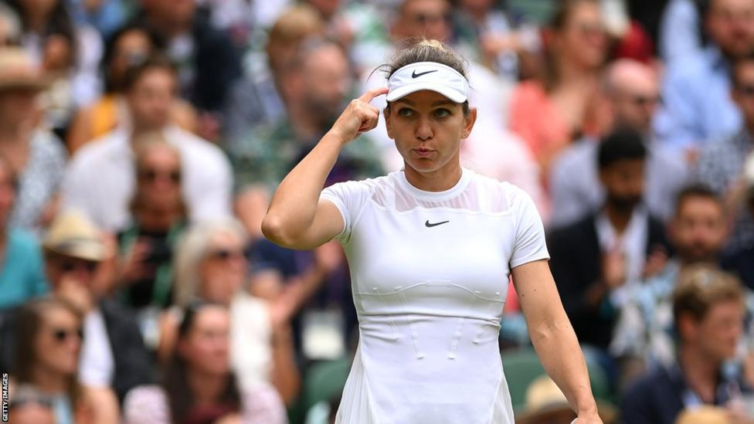Two-time Grand Slam champion Simona Halep has been charged with a second doping offence over "irregularities in her athlete biological passport".
The Romanian, 31, has been suspended since October after testing positive for a banned substance at the US Open.
Her additional charge is separate to the one she is already suspended for.
Halep said on Instagram she feels "helpless facing such harassment" and denies the charges, suggesting she has been "a victim of a contamination".
The athlete biological passport programme collects and compares biological data to spot discrepancies over time that suggest possible doping.

Former world number one Halep's suspension last year was imposed after she tested positive for roxadustat, an anti-anaemia drug which stimulates the production of red blood cells in the body.
She criticised the International Tennis Integrity Agency (ITIA), which is responsible for testing within the sport, for its handling of her case, arguing that there had been unnecessary delays in the process.
"I have lived the worst nightmare I have ever gone through in my life," she said.
"Not only has my name been soiled in the worst possible way, but I am facing a constant determination from the ITIA, for a reason that I cannot understand, to prove my guilt while I haven't ever thought of taking an illicit substance."
Halep added that she hopes to have the chance to prove her innocence at a hearing scheduled for the end of May.
The ITIA said it was continuing discussions with an independent tribunal team and with Halep's representatives to get the matter resolved as quickly and efficiently as possible, although did not indicate how long that would take.
Nicole Sapstead, the ITIA's senior director for anti-doping, said: "We understand that today's announcement adds complexity to an already high-profile situation.
"From the outset of this process - and indeed any other at the ITIA - we have remained committed to engaging with Ms Halep in an empathetic, efficient and timely manner."
In April, Halep spoke for the first time since her suspension, saying she was frustrated with the time it was taking for the case to be resolved but the ITIA said "the process is ongoing".
The investigations into failed tests by the ITIA are often a complex process, even more so when a player denies taking a substance knowingly.
It is not uncommon for these cases to take several months to be resolved.
In such cases, a player can produce evidence to either disprove or explain the failed test, which Halep claimed she had done.
This would bring further investigation and testing by the ITIA, leading to the process being further extended.
Halep, who was ranked ninth when the ban came into force, is one of the highest-profile tennis players to fail a drugs test, and the most prominent since Russian five-time major champion Maria Sharapova was banned in 2016.
Latest Stories
-
Brazilian Supreme Court justice threatens to arrest Bolsonaro
3 hours -
Queen Elizabeth II’s fashion to feature in exhibition
3 hours -
North Macedonia backs Morocco’s autonomy plan as sole basis for resolving Sahara dispute
4 hours -
Coach Lars Björkegren “proud” of Black Queens after penalty defeat to Morocco
4 hours -
Hosts Morocco to take on Nigeria in African women’s final
4 hours -
We were the better team – Queens coach Bjorkegren reflects on WAFCON 2024 semi-final loss
4 hours -
Mali court rejects appeal to release four Barrick employees, judge says
4 hours -
Kenyan man on death row in Saudi Arabia freed
4 hours -
Euro 2025: England beat Italy to reach finals
4 hours -
Ho Technical University partners with GhIE Branch 6 For Engineering and Innovation Week
4 hours -
The voices in the cockpit fuelling controversy over Air India crash
4 hours -
Mike Lynch estate and business partner owe HP Enterprise £700m, court rules
5 hours -
Trump administration pulls US out of UNESCO again
5 hours -
WAFCON 2024: Ghana’s Black Queens miss out on final after penalty loss to Morocco
5 hours -
Coca-Cola will roll out cane sugar Coke in US after Trump push
5 hours

